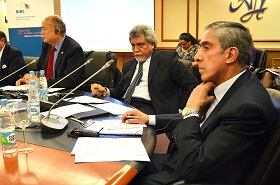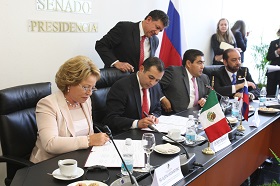Speech by Alexander Shchetinin, Director of the Latin American Department of the Russian Foreign Ministry, at the Roundtable “Russia and Pacific Alliance: Opportunities for Expanded Cooperation”, RIAC, September 30, 2014.
Speech by Alexander Shchetinin, Director of the Latin American Department of the Russian Foreign Ministry, at the Roundtable “Russia and Pacific Alliance: Opportunities for Expanded Cooperation”, RIAC, September 30, 2014.
Dear Igor Sergeevich,
Your Excellency and my friend Ruben Beltran Guerrero,
Dear Vladimir Mikhailovich,
Respected discussion participants,
I'll be honest with you: I do not want to speak today as Director of the Latin American Department of the Russian Foreign Ministry. Such an official status imposes certain restrictions. Instead I favor an informal discussion, especially since the topic and the current situation surely deserve one.
I want to thank the RIAC and the Institute of Latin America for preparing an interesting report on the current state and prospects for Russian-Mexican relations. This is a good starting point for discussion.
Such a discussion is very timely against the backdrop of the significant intensification of Russian-Latin American cooperation in various fields. The coming 125th anniversary of the establishment of diplomatic relations between Russia and Mexico, which we will celebrate next year, also prompts us to hold this discussion.
I should start by confessing that I, like many in this hall, love Mexico, love its history, culture and wonderful people. My diplomatic career started in Mexico. The country has taught me a lot. I think that I have the right to speak quite frankly today primarily due to this period in my life rather than my formal position.
Indeed, it is an incontestable fact that for many decades of Soviet history, we “entered” Latin America through Mexico. Our study of Latin America also began with Mexico. We drew parallels between revolutionary processes and remembered years of solidarity. Mexican foreign policy demonstrated a number of very significant components relating to international law that in the first hand testified to the similarity of our approaches to and assessment of the international situation. If not immediately, we did learn to understand each other, be it the Treaty of Tlatelolco, the Contadora Group or the Delhi Six.
The fall of the Soviet Union radically changed the geopolitical situation – and for Mexico, too. I will not speak of the damage inflicted to Russia's foreign policy by the Ministry under Andrei Kozyrev – thank God, we were able to overcome this through the efforts of Yevgeny Primakov, Igor Ivanov, Sergei Lavrov and, above all, Vladimir Putin.
The difficult period of the 1990s is covered in the Report in detail. But for the sake of honesty, another thing should be emphasized too.
This period marks the beginning of serious changes to the political milestones in Mexico. The creation of NAFTA with the United States and Canada has not only increased the dependence of the country’s economy on its northern neighbor. In fact, it has signified the establishment of a single economic structure with all the ensuing consequences and assessments, in particular, of macroeconomic indicators of Mexico or of ideas to create a free trade zone between the two countries.
In 2000, changes in the economic orientation of the country were followed by changes in the political orientation, which became particularly evident during the second government of the National Action Party (PAN), headed by Felipe Calderón.
Unfortunately, our bilateral relations at that time faced serious disagreements. At the level of social, humanitarian and cultural ties, relations continued to be maintained, which could not have been otherwise. After all, the historical and cultural affinities persisted, despite all the political twists and turns. Contacts were kept up, visits were exchanged, but the political dialogue between Russia and Mexico began to lose momentum. This was particularly noticeable against the background of our growing cooperation with the rest of Latin America, which intensified notably.
We witnessed a radicalization of foreign policy views in Mexico City. If in the past, adhering to “extreme” positions in regard to, say, requirements for nuclear disarmament, Mexican diplomats were ready to support step-by-step strengthening of the nonproliferation regime and arms control, nowadays radicalism has in many ways become for Mexico synonymous with the criterion of “you're either with us, or against us.”
I will not talk about how important it is to listen to and hear the other party on this issue. We do hope that our Mexican colleagues will hear our arguments on the “humanitarian aspects of nuclear disarmament,” or for no first deployment of weapons in outer space and the necessity to maintain such a negotiation platform as the Conference on Disarmament.
As it is, I would describe Mexico’s approach as “pseudo Bolshevik.” During Soviet times, there was once a misprint in the lyrics of the party anthem “The International”. Instead of “We’ll raze all the world of violence and then…” it was printed "We’ll violently raze the whole world and then…” The second sentence very clearly describes a number of key foreign policy approaches of Mexico.
I am not going to dwell on this subject any further and will confine myself to noting that much has to be done to bring together our positions on the issue of human rights. We hope that our arguments on the situation in Ukraine will be heard with attentive ears. We understand the history of Texas, but also made a note of the publicly expressed position of the Mexican Ministry of Foreign Affairs to assess the situation in line with “all of the democratic community.”
We are interested in Mexico’s active role in the Latino community. We welcome its contribution to the creation of the Community of Latin American and Caribbean States (CELAC). It is no secret that many countries have for some time reckoned Mexico among states of the “North America” region. In this country, there are some researchers who tend to think so too. Nevertheless, we still continue to regard Mexico as part of Latin America, although a very specific part.
I would like to repeat what President of the Russian Federation Vladimir Putin said on the eve of his visit to the region in July 2014. We are interested in a politically independent, united and economically strong Latin America. I should add that we are very interested in Mexico’s distinctive and constructive role in this process, aimed at preventing a split in the region on territorial, economic or ideological grounds.
Noting all this, I would add that it would be wrong and misleading to look at Mexico from the positions of the 1970s-1980s. We are different now, and Mexico is different too. And we have to be much more realistic in passing judgment.
But I still want to talk with optimism. We have good examples of economic cooperation, especially in regard to the supply of the Sukhoi Superjet 100 to Mexico and Mexican investment projects in Russia. We still appreciate highly the culture and traditions of one another. There is a steady flow of tourists, which did not exist before.
Now we should search for a realistic field for foreign policy cooperation, which will be free from extreme positions and allow listening to and understanding each other’s point of view, as well as taking account of each other’s national priorities and concerns. I believe that we shall succeed by all means. We are optimists. Because «como México no hay dos».





